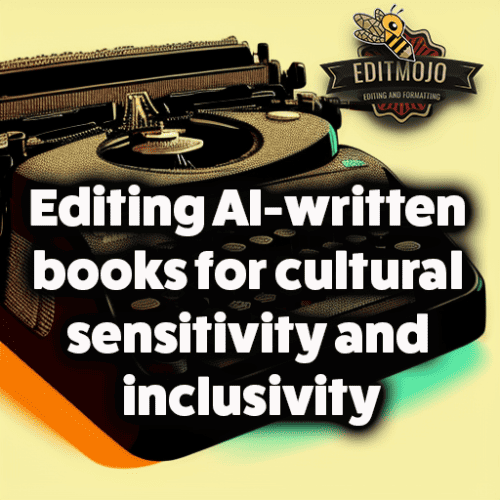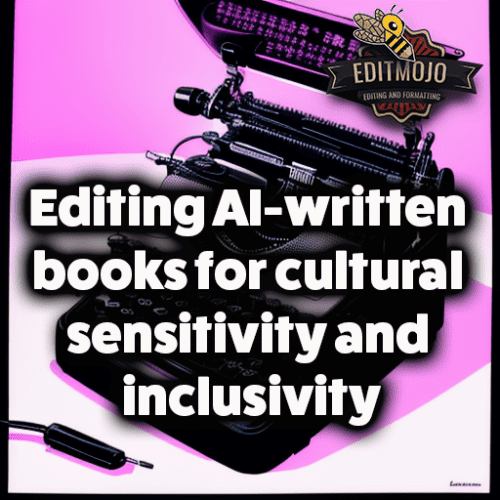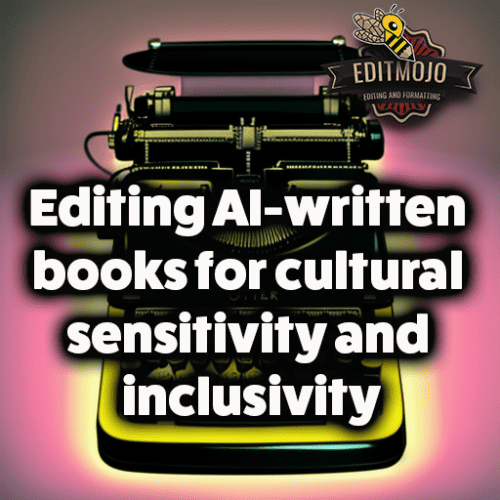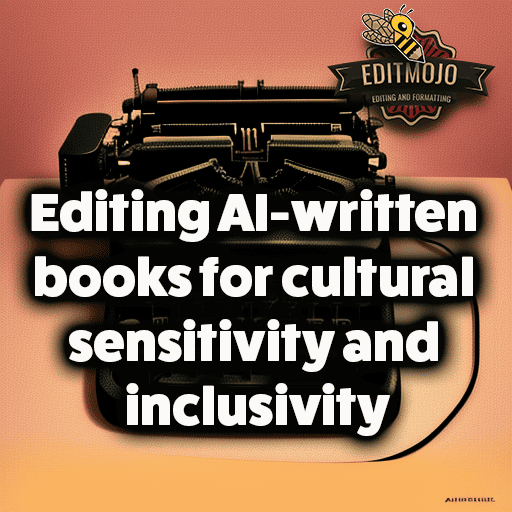Editing AI-written books for cultural sensitivity and inclusivity
Editing AI-written books for cultural sensitivity and inclusivity. In the heart of every story, there lies a nexus of humanity – shared experiences that cross borders, cultures, and identities. With the rise of artificial intelligence (AI) in the literary world, these shared experiences are sometimes generated by non-human entities. While AI offers stunning potential in creating literary content, it also poses unique challenges. These challenges are especially pronounced when dealing with cultural sensitivity and inclusivity. Can AI truly capture the human experience across diverse cultures? This is where the critical role of human editors comes into play.
Key Takeaway Table
| Section | Key Takeaway |
|---|---|
| II. Understanding AI and its Applications in Literature | AI and machine learning are transforming the literary world but their limitations, especially in understanding human experiences and cultural nuances, are notable. |
| III. Cultural Sensitivity and Inclusivity in Literature | Cultural sensitivity and inclusivity are essential in literature to reflect our diverse society and promote understanding, empathy, and unity. |
| IV. Challenges of AI in Writing Culturally Sensitive and Inclusive Content | AI often struggles with creating culturally sensitive and inclusive content due to its inability to understand cultural nuances and human emotions. |
| V. The Role of Editors in AI-Written Books | Editors play a crucial role in correcting cultural insensitivity and ensuring inclusivity in AI-written books, acting as cultural consultants and sensitivity reviewers. |
| VI. Best Practices for Editing AI-Written Books | Editors need to identify and rectify cultural insensitivity and lack of inclusivity in AI-written content, potentially with the help of cultural consultants or sensitivity readers. |
| VII. The Future of AI in Literature and Human Intervention | Despite AI’s growing impact on literature, the role of human editors remains irreplaceable, particularly in ensuring cultural sensitivity and inclusivity. |
II. Understanding AI and its Applications in Literature
AI and Machine Learning: At the core of our modern technological revolution, AI and machine learning are transformative forces. AI is essentially a computer system capable of performing tasks that usually require human intelligence, while machine learning is a subset of AI that enables computers to learn and adapt from experience^1^.
In the context of literature, these technologies have been used to create everything from short stories to entire novels. OpenAI’s GPT-3, for example, has astounded the world with its capabilities, generating text that is often indistinguishable from human-written prose^2^.
AI in Literature: A noteworthy example of AI in literature is the book “1 the Road” by Ross Goodwin^3^. This novel was entirely written by an AI that was fed numerous science fiction novels to learn and generate a novel of its own. But the book, while an interesting experiment, also highlighted the limitations of AI writing, particularly in its lack of coherent plot and character development.
III. Cultural Sensitivity and Inclusivity in Literature: A Must-Have
Literature should be a mirror to our society, reflecting all its myriad faces. Cultural sensitivity implies an understanding, awareness, and respect for other cultures and societies. Inclusivity, on the other hand, ensures that all individuals, regardless of their cultural, racial, or social backgrounds, are fairly represented.
The infamous controversy around J.K. Rowling’s depiction of Asian characters in “Harry Potter”^4^ is a stark reminder of the potential harm that can arise from cultural insensitivity. Conversely, a culturally sensitive and inclusive book can foster understanding, empathy, and unity.

IV. Challenges of AI in Writing Culturally Sensitive and Inclusive Content
AI’s core challenge in creating culturally sensitive content lies in its fundamental nature. It lacks human experiences, the nuances of culture, and understanding the depth of emotions that often underpin cultural narratives.
For example, the translation AI developed by Facebook was embroiled in a controversy when it mistranslated a phrase, leading to the arrest of a Palestinian man^5^. The incident highlighted the dangerous consequences of AI’s inability to understand cultural nuances.
V. The Role of Editors in Ensuring Cultural Sensitivity and Inclusivity in AI-Written Books
Traditional editors have always been gatekeepers, ensuring the content they oversee is up to the mark. But when it comes to AI-written books, their role expands exponentially. They become cultural consultants, sensitivity reviewers, and inclusivity checkers all rolled into one.
An excellent example of this is when Penguin Random House employed sensitivity readers in the editing of AI-written content^6^. The editors were specifically looking for potential cultural insensitivity and worked to correct them.
VI. Best Practices for Editing AI-Written Books for Cultural Sensitivity and Inclusivity
When editing AI-written content, it’s vital to remain alert to potential issues of cultural insensitivity or lack of inclusivity. Here are some steps you might consider:
Identification: Look for stereotypes, biased language, or misrepresented cultural elements. Remember, what is offensive to one culture may not be to another.
- Rectification: Once identified, replace insensitive content with accurate and respectful depictions. Engage with cultural consultants or sensitivity readers if required.

VII. The Future of AI in Literature and the Importance of Human Intervention
Despite the limitations of AI in creating culturally sensitive and inclusive content, its impact on the literary world is undeniable. With more advanced AI and machine learning, the richness and complexity of AI-generated content will only increase.
Yet, the role of human editors remains irreplaceable. As we traverse this brave new world of AI literature, it is up to us, the editors, to ensure that the stories we help craft truly reflect the beautiful tapestry of human experience.
VIII. Conclusion (Editing AI-written books for cultural sensitivity and inclusivity)
AI-written books are here to stay, and their influence is only set to grow. Yet, they carry an inherent risk of creating content that lacks cultural sensitivity or inclusivity. The responsibility lies with us, the human editors, to ensure that these potential pitfalls are carefully avoided.
IX. Additional Resources (Editing AI-written books for cultural sensitivity and inclusivity)
To further explore this topic, you might find these resources helpful:
- “Machine Learning: A Probabilistic Perspective”^7^ for an in-depth understanding of machine learning.
- The “Cultural Sensitivity in Editing” course offered by the American Society of Journalists and Authors^8^.
- The editing software Grammarly, which has recently incorporated a cultural sensitivity checker^9^.

Top Five Questions and Answers (Editing AI-written books for cultural sensitivity and inclusivity)
- Q: Can AI generate culturally sensitive and inclusive content?
- A: While AI has made remarkable strides in generating text, its ability to create culturally sensitive and inclusive content is limited. AI lacks the ability to understand human experiences and cultural nuances, which are key to creating such content.
- Q: How can editors ensure cultural sensitivity and inclusivity in AI-written books?
- A: Editors can play a crucial role by acting as cultural consultants and sensitivity reviewers. They need to identify potential issues of cultural insensitivity or lack of inclusivity and rectify them.
- Q: Are there instances where AI has created culturally insensitive content?
- A: Yes, there have been instances where AI has created culturally insensitive content. For instance, Facebook’s translation AI caused a controversy when it mistranslated a phrase, leading to the arrest of a Palestinian man.
- Q: What are the benefits of cultural sensitivity and inclusivity in literature?
- A: Cultural sensitivity and inclusivity in literature can foster understanding, empathy, and unity among readers. It can also provide fair representation to all individuals, regardless of their cultural, racial, or social backgrounds.
- Q: Will the role of human editors diminish with the advancement of AI in literature?
- A: Despite the advancements in AI, the role of human editors remains crucial, particularly in ensuring cultural sensitivity and inclusivity in AI-written content. Humans possess a deep understanding of cultural nuances and emotions, which is currently irreplaceable by AI.
